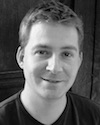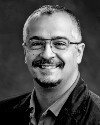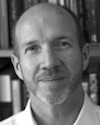 |
Darlow, MarkMark Darlow specialises in eighteenth-century French theatre and music (especially opéra-comique), Rousseau, Bernardin de Saint-Pierre and the culture of the Revolutionary period. He is currently researching the posterity of French ‘classical’ theatre in the Enlightenment, with particular interest in material culture and book history. His work to date has sought to bring into dialogue approaches to eighteenth-century French theatre and musicology, most often from a cultural historical perspective (a methodology he has taught as part of the core course in theory for the Faculty’s MPhil course in European Literatures and Cultures). |
 |
Fanlo, IsaiasIsaias Fanlo’s research include 20th–21st centuries Iberian, Latin American and Latinx literatures and cultures; queer theory and activism; representations of race; theatre, performance and scenic arts; film media studies; and history of photography. He is currently working on different publications that address intersectional topics such as testimonial queer/trans black narratives in theatre and performance, the problematics of postforgetting in Spanish culture and politics, and drag and non-binary imaginary in contemporary Spanish visual cultures. |
Franklin-Brown, MaryMary Franklin-Brown studies medieval writing in French, Occitan, Latin, and Catalan. She interprets these texts though the dual lenses of medieval philosophy and current critical thought, and she also takes account of the material transmission of texts through performance or manuscript copy. Her Reading the World: Encyclopedic Writing of the Scholastic Age (University of Chicago Press, 2012), a Foucauldian archaeology of medieval encyclopaedias, received the Harry Levin Prize from the American Comparative Literature Association. |
|
 |
Webber, Andrew J.Andrew J. Webber is Professor of Modern German and Comparative Culture. He has research and teaching interests in a wide range of German and comparative film, from the 1920s to the present day. A particular concern of his work is how film relates to psychoanalysis, the Gothic imagination, constructions of gender and sexuality, and the urban, and he has published essays on combinations of all of these. |


